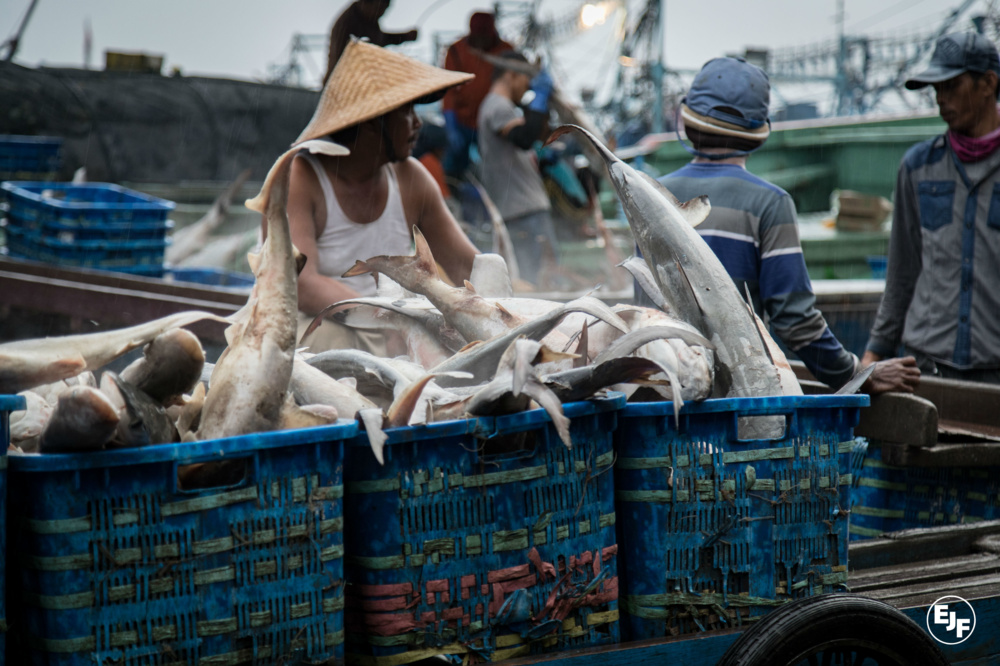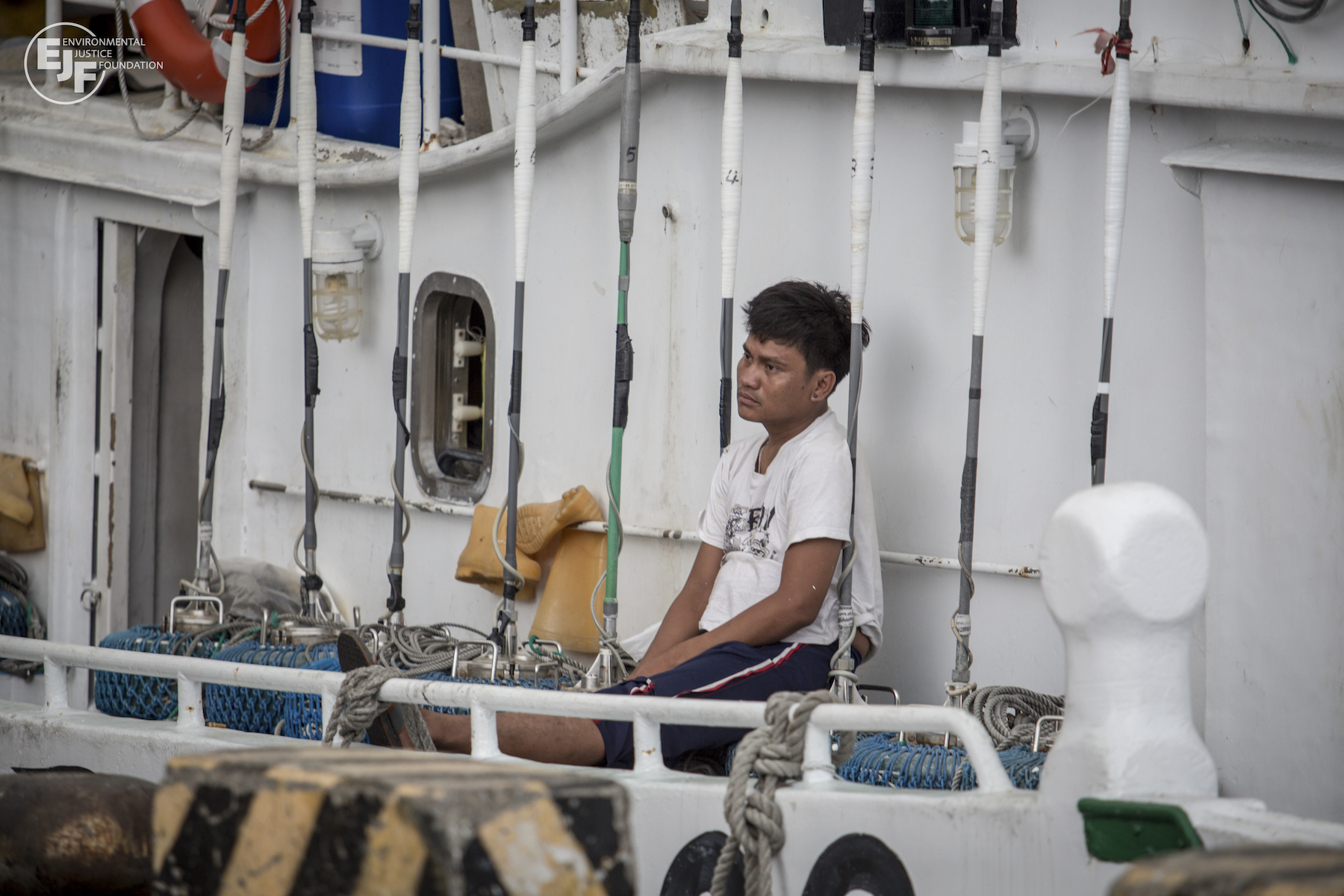
Taiwan must tighten regulations to end human trafficking say NGO protesters
The NGO coalition ‘Human Rights for Migrant Fishers’ staged a protest today in Taipei outside the Taiwan government’s workshop on combating human trafficking. The government is not doing enough to eradicate human rights abuses and human trafficking in the fishing industry and some of its policies may even pave the way for such abuse, the coalition says.
This week, the Taiwan Immigration Agency is hosting the 2018 International Workshop on Strategies for Combating Human Trafficking, and has invited experts from all over the world to discuss how to abolish human trafficking.
Despite this progressive action, the coalition says, the country does not do nearly enough to combat the exploitation and inhumane working and living conditions for the most vulnerable migrant workers: those on Taiwanese fishing vessels, and especially the distant water fishing fleet. Some of its policies even create the conditions for human rights abuses.
The NGOs point to the latest US Trafficking in Persons Report, which highlighted recent cases such as the 81 migrant fishers who were locked in a cramped basement while their vessel was in port, and the behaviour of Taiwanese company Giant Oceans, which trafficked Cambodian fishers without being sanctioned.
Just this month, the International Labour Organization reported that a Taiwanese ship was the first be detained for violating its basic standards of decent work in the fishing industry – the Work in Fishing Convention C188. The vessel was detained in South Africa, Taiwan itself has not yet ratified C188. This highlights the lack of the fit-for-purpose legal regime needed to truly eradicate these abuses on the Taiwanese fleet, say the Human Rights for Migrant Fishers coalition.
“Tackling human trafficking in migrant fishers is gaining increased attention on the international stage and the Taiwanese government must take it seriously,” says Greenpeace’s Oceans project lead Jodie Lee. “Workers on board distant water fishing vessels are especially vulnerable to such abuse and the vast size of Taiwan’s distant water fishing fleet means it has a particularly great responsibility.”
Deputy Director of the Environmental Justice Foundation Max Schmid adds: “There is still a significant gap between Taiwan’s regulations and international standards. Currently Taiwan’s systems cannot effectively protect migrant fishers from trafficking. The Taiwan government must urgently ratify international conventions, including the Work in Fishing Convention, and robustly implement laws to address both human rights abuses and the related problem of illegal, unreported and unregulated fishing.”
The Secretary General of the Taiwan International Workers Association Chen Hsiulien (陳秀蓮) says: “The current regulations cannot stop the human rights abuse – in fact they might even drive it. For instance, migrant workers are not allowed to freely change jobs – legally they have to have permission from their current boss or the government. Some employers use this to threaten workers.”
“The Fishery Agency also allows brokers to charge migrant fishers a fee before they start work – creating the ideal conditions for debt bondage,” adds Director of Serve the People Association Lennon Wong (汪英達). “In addition, many migrant workers’ identity documents are held by the brokers or employers – they are powerless.”
“Although the US Trafficking in Persons Report has given Taiwan a tier 1 ranking, the highest there is, for the last nine years, it has also emphasised the human rights abuse in Taiwan’s distant water fisheries in every single year’s report. It shows that the problem has always been there, but the government only tries to cover it up instead of really dealing with it,” says Secretary General of the Yilan Migrant Fishermen Union Allison Lee (李麗華)
Information for editors
Images of the protest will be available on the day, please email the contacts below if you would like these. For a copy of our full gap analysis of how Taiwan regulations fall short of international standards please email the contacts below.
Contacts:
Max Schmid
Deputy Director of the Environmental Justice Foundation
Sophie Nodzenski
Environmental Justice FoundationOceans Campaigner
sophie.nodzenski@ejfoundation.org
Tel: +44 (0) 207 239 3310
Members of the NGO coalition:
Environmental Justice Foundation (EJF)
EJFis a UK-based charity working internationally to protect the environment and defend human rights. EJF is a charity registered in England and Wales (1088128). www.ejfoundation.org
Watch EJF’s film: Exploitation and Lawlessness: The Dark Side of Taiwan's Fishing Fleet
Greenpeace
Greenpeace is an independent, nonprofit, global campaigning organization that uses non-violent, creative confrontation to expose global environmental problems and their causes.
http://www.greenpeace.org/taiwan/zh/
The Presbyterian Church in Taiwan Seamen and Fishermen’s Service Center (PCTSFSC)
PCTSFSC is a Christian organization caring for fishermen and providingassistance and support to fishermen worldwide.
https://www.facebook.com/pctsfsc/
Serve the People Association (SPA)
SPA is a labor right organization promoting the rights of immigrants, local and migrant workers.
https://www.facebook.com/spa.taoyuan/
Taiwan International Workers' Association (TIWA)
The main goals of TIWA are to promote cooperation between migrant and local workers, improve the working conditions and social environment for migrant workers in Taiwan, and to increase workers’ rights and benefits.
Taiwan Association for Human Rights(TAHR)
TAHR is an independent non-governmental organization and was founded on 10th December 1984 (International Human Rights Day). It is a member-based NGO and run by full time activists and volunteers. TAHR committed to securing and protecting human rights from all forms of violation.
https://www.tahr.org.tw/content/25
Yilan Migrant Fishermen Union (YMFU)
YMFU is the only migrant fishermen union in Taiwan and is securing better working condition for migrant fishermen. YMFU assists individual cases for the members as well as advocate for better policy.
https://www.facebook.com/yilanfishermen/
Key facts:
- Taiwan has one of the largest deep water fishing industries in the world. According to the Taiwanese Fishery Agency, in 2016 it caught more than 820,000 tons. The export value of the industry over recent years has ranged between US$1.6 billion to US$2 billion. These products usually land in foreign countries, such as Thailand and Mauritius, and are then transported to local factories for processing before being re-exported to the final consumer markets.
- Taiwan produces seafood exports worth about US$150 million to the USA and US$17 million to the EU. Exports to Japan, a major market for the country, reach up to US$475 million. In addition, tuna exports to Thailand, much of which are processed and then sent on to the USA and EU, total $180 million.
- According to data provided by the Fishery Agency and Ministry of Labor, in 2016 there were about 26,000 migrant workers working in the Taiwanese fishing industry. However, the US Department of State Trafficking in Persons Report 2014 cites estimates of up to 160,000 migrant workers in Taiwan fishing industry.
- The total value of financial losses due to the related problem of illegal, unreported and unregulated fishing is estimated at between US$10 billon and US$23.5 billon every year.
SIGN UP FOR OUR EMAILS AND STAY UP TO DATE WITH EJF

